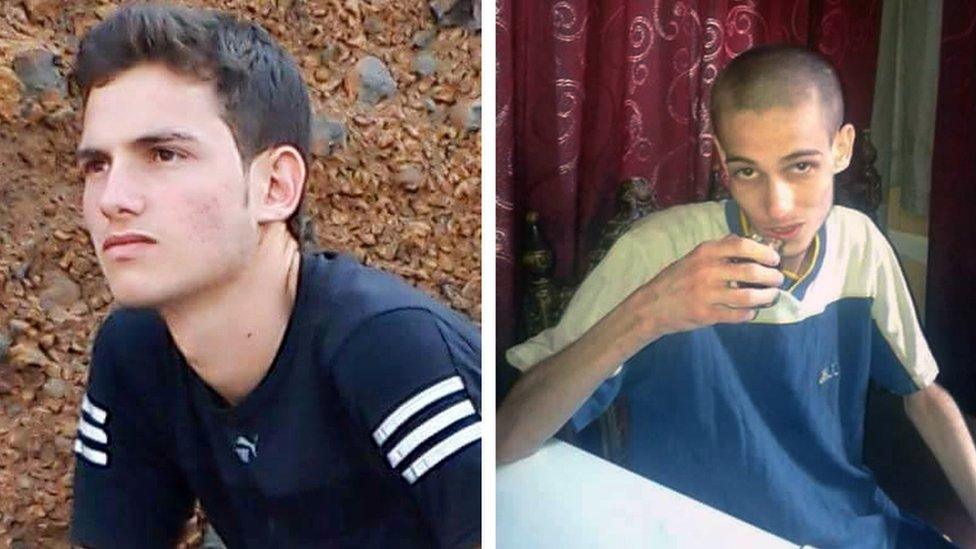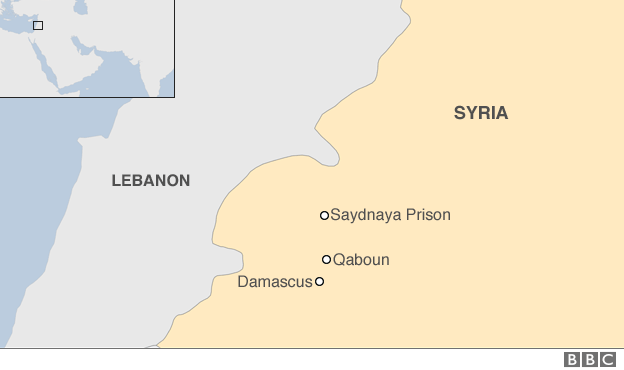Syria conflict: Thousands hanged at Saydnaya prison, Amnesty says
- Published
Amnesty International says Saydnaya prison may hold between 10,000 and 20,000 people
As many as 13,000 people, most of them civilian opposition supporters, have been executed in secret at a prison in Syria, Amnesty International says.
A new report, external by the human rights group alleges that mass hangings took place every week at Saydnaya prison between September 2011 and December 2015.
Amnesty says the alleged executions were authorised at the highest levels of the Syrian government.
The government has previously denied killing or mistreating detainees.
However, UN human rights experts said, external a year ago that witness accounts and documentary evidence strongly suggested that tens of thousands of people were being detained and that "deaths on a massive scale" were occurring in custody.
Amnesty interviewed 84 people, including former guards, detainees and officials at Saydnaya prison for its report.
Thousands hanged at Saydnaya prison, Amnesty report says
It alleges that every week, and often twice a week, groups of between 20 and 50 people were executed in total secrecy at the facility, just north of Damascus.
Before their execution, detainees were brought before a "military field court" in the capital's Qaboun district for "trials" lasting between one and three minutes, the report says.
A former military court judge quoted by Amnesty said detainees would be asked if they had committed crimes alleged to have taken place. "Whether the answer is 'yes' or 'no', he will be convicted... This court has no relation with the rule of law," he said.
According to the report, detainees were told on the day of the hangings that they would be transferred to a civilian prison then taken to a basement cell and beaten over the course of two or three hours.

Former detainee Omar al-Shogre before his arrest and shortly after his release from Saydnaya

Then in the middle of the night they were blindfolded and moved to another part of the prison, where they were taken into a room in the basement and told they had been sentenced to death just minutes before nooses were placed around their necks, the report adds.
The bodies of those killed were allegedly then loaded onto lorries, and transferred to Tishreen military hospital in Damascus for registration and burial in mass graves located on military land.
On the basis of evidence of the testimony of its witnesses, Amnesty estimates that between 5,000 and 13,000 people were executed at Saydnaya over five years.

Witness accounts
A former judge who saw the hangings:
"They kept them [hanging] there for 10 to 15 minutes. Some didn't die because they are light. For the young ones, their weight wouldn't kill them. The officers' assistants would pull them down and break their necks."
'Hamid', a former military officer who was detained at Saydnaya:
"If you put your ears on the floor, you could hear the sound of a kind of gurgling. This would last around 10 minutes… We were sleeping on top of the sound of people choking to death. This was normal for me then."
Former detainee 'Sameer' describes alleged abuse:
"The beating was so intense. It was as if you had a nail, and you were trying again and again to beat it into a rock. It was impossible, but they just kept going. I was wishing they would just cut off my legs instead of beating them any more."
Source: Amnesty International

Although it does not have evidence of executions taking place since December 2015, the group says it has no reason to believe they have stopped and that thousands more were likely to have died.
Amnesty says these practices amounted to war crimes and crimes against humanity.
It also notes that death sentences have to be approved by the grand mufti and by either the defence minister or the army's chief of staff, who are deputised to act on behalf of President Bashar al-Assad.
The human rights group says it contacted the Syrian authorities about the allegations in early January but has received no response.
Last August, Amnesty reported that, external an estimated 17,723 people had died in custody as a result of torture and the deprivation of food, water and medical care between March 2011 - when the uprising against President Assad began - and December 2015. That figure did not include those allegedly hanged at Saydnaya.